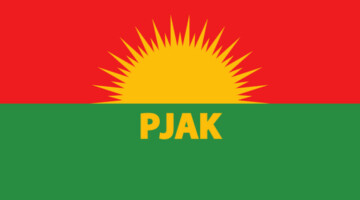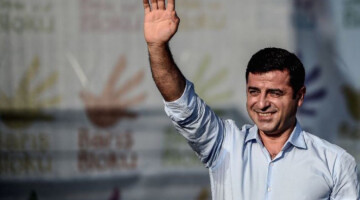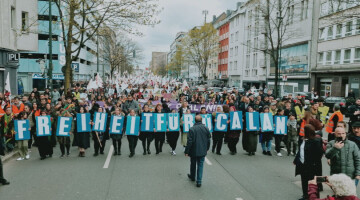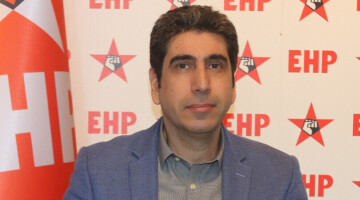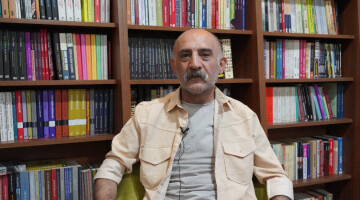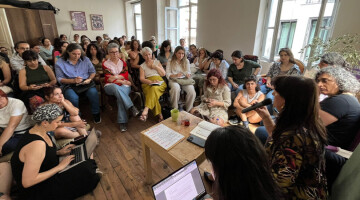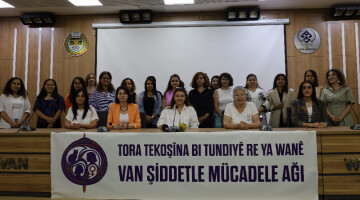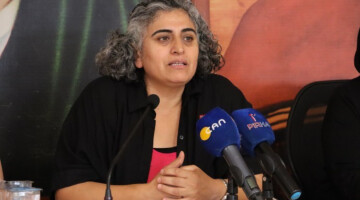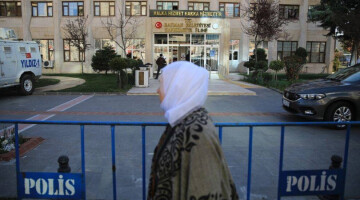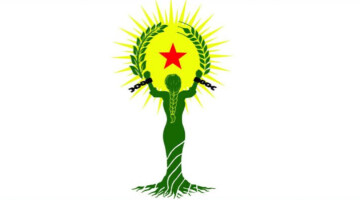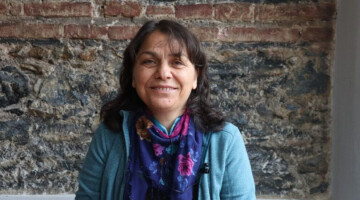At the Technical University in Berlin, the international women's conference "Our Revolution: Liberating Life" of the network "Women Weaving Future" continued on the second day. The first day of the conference concluded with a concert by the Kurdish musician Yalda Abbasi.
The second day of the conference was dedicated to political prisoners. "We want to remember all political prisoners. There are many women who cannot be with us today because they are imprisoned for their struggle for freedom. The price they pay is their own freedom," the welcome address said.
KJAR: The women will not leave the streets
At the beginning of the programme, a video of the Community of Free Women of Eastern Kurdistan (KJAR) was shown in which a KJAR representative expressed her conviction that the revolution in Rojhilat (Eastern Kurdistan) and Iran would be successful: "A dictatorial regime has been in power for 43 years, that is enough. The women in Iran and Rojhilat had to live like slaves in society." The fascist regime could only be overthrown by women's hands, she said. The KJAR representative pointed out that women had been deprived of their freedom and systematically disenfranchised, among other things, by being forced to wear headscarves. “There are hundreds of women who have been raped, imprisoned or attacked with acid, but they hold their heads high. The women went to the barricades and would not leave the streets. Especially the Kurdish population continue the uprising so that the Kurdish woman, Jina Mahsa Amini, who was murdered by the Iranian morality police, is not forgotten. The slogan "Jin, Jiyan, Azadî" (Woman, Life, Freedom) is based on the legacy of decades of resistance in Kurdistan and destroys the ideology of the Iranian state. Men have also joined the protest and stood up together with women to fight against the state in which they see no hope,” said the KJAR representative who greeted the participants of the conference on behalf of the women of Rojhilat and wished them all success.
"From the balconies to the barricades"
The first session on the second day of the conference was moderated by Rahila Gupta, a freelance journalist and Southall Black Sisters activist from the UK. Rahila began by explaining that she had looked at Abdullah Öcalan's reading list, which included many feminist writers such as Judith Butler.
"How can the fragmentation of class, nationalism, religion caused by patriarchal mentality be overcome and how can we become independent of the thought structures of the male-dominated system?" the moderator asked, explaining that women's struggles would risk being reincorporated into the system unless a real alternative paradigm was developed - one based on intellectual and theoretical critique and capable of truly overcoming the limitations of the system.
The title of the session was "The life we dream of will not come through miracles, but through revolution" and was a quote from Abdullah Öcalan. The question of the session was "How do we get the women from the balconies to the barricades?" Part of the success of the Kurdish movement, she said, was based on the fact that activists went door to door to talk to everyone about what society should look like. The civil war in Syria created the right conditions for a "revolution within the revolution" in Rojava and it is important to reflect that the second wave of feminism was a significant foundation for Öcalan's work.
Women's revolution in Sudan
The first speaker was Shahida Abdulmunim from the Gender Centre for Research and Training in Sudan. The revolution in her country is also being made by women, said Shahida, explaining that for 80 years, since the beginning of the dictatorship in Sudan, women have been in the forefront of the resistance. In 1990-1999, almost only women were on the streets, fighting against the Bashir regime and celebrating great successes. During the 2018 uprising too, she said, women were prepared and led the struggles. They fought against toxic masculinity and patriarchy, the speaker explained. Abdulmunim noted that she herself was on the streets and was one of the participants in the revolution; 70 per cent of the people on the streets were women. These women came from 50 different groups and had to unite.
The patriarchal resistance and the state tried to weaken this movement, among other things, by appointing a woman to represent the movement. Three women became part of the government congress, but they were not representatives of the movement. Many laws were changed to the disadvantage of women. Shahida compared these laws to those of Iran. She said that 5000 women were in prison in Sudan for political reasons. “The regime even finances itself from the fines that women have to pay. The aim of the regime is to exclude half of the people in Sudan from political life. In my opinion, the hijab is not only a scarf, but prohibits women from participating and living in society.”
Shahida concluded: "What we wear, what we want, where we go, whether we wear a hijab or not, is not a religious issue, it is a political issue. We have to fight the regimes in our countries. We are fighting against neoliberalism and patriarchy, and we want to liberate our countries, to liberate ourselves!"
The Kurdish movement is one of the strongest democratic movements in Europe
The second speaker was Kurdish sociologist and author Dr Dilar Dirik, who began her speech by commemorating the journalist and Jineolojî researcher Nagihan Akarsel, who was murdered in Sulaymaniyah, Southern Kurdistan by the Turkish secret service MIT.
Dirik said that one has to talk about fragmentation on the global level. At the last conference, she said, there was talk about women's organising increasing, but at the same time there was also an increase in racist, fascist movements. “The Trumps, Erdoğans, Bolsonaros are the result of fascist movements, they represent the naked face of capitalist patriarchy. Liberalism is being imposed on the emerging women's struggles and "pinkwashing" is taking place in the face of NATO violence. Even their own movements are being appropriated by neoliberalism and made a product of capitalism. The capitalist system itself uses the image of women in struggle and tries to take over feminist movements.” Dirik asked, "What kind of resistance is allowed and which is criminalised? The Kurdish movement is a good example of this.”
“How, for example, did Daesh, the so-called "Islamic State", grow stronger and develop? This is an important question for the women's movement, so that something like this does not happen again.” With regards to the World Cup in Qatar, the speaker asked why no one was talking about the fact that the Islamist Al-Nusra Front was being co-financed by Qatar. Qatar, she said, is also at the forefront of supporting the Taliban.
Dilar Dirik went on to say that it is necessary to get out of the discourse that Turkey is a rogue state and should be excluded from NATO. “Rather, Turkey is an integral part of NATO. Knowledge production should not be left to the states. The German Foreign Minister, who adorns herself with the slogan "Jin Jiyan Azadî", actively supports those forces that attack women. The propaganda of the Western states is so powerful that many people do not even know how many crimes NATO commits, which wars it finances and which are waged in its name. Of course, it is always easier to criticise countries that are not in NATO and to declare them the enemy.”
Dirik explained that the Kurdish movement is also one of the strongest democratic movements in Europe. Despite massive criminalisation, it is able to organise protests across Europe in a very short time, she added. “It is not possible to understand the fragmentation of the protests if fascist movements are only analysed locally. Women's movements worldwide should not only deal with the cultural problems of their own nations. Rather, it is necessary to ask how the government of one's own country is involved in the creation, financing and building of Islamist, fascist organisations worldwide.”
The conference, she said, is a good example that women can organise without the state - freely and autonomously. In conclusion, Dirik demanded that the movement must radicalise itself and overcome liberalism. Likewise, it must fight to ensure that its own slogans are not stolen by the system.
Feminism as the rebellion of the oldest colony
The second part of the session was titled "Feminism - the rebellion of the oldest colony and what lies behind it". Rahila Gupta posed the question: "What has been the role and contribution of feminism to the struggle of women in the past and present? What are the causes of the obstacles that feminism faces? How can feminism adopt an anti-system stance?"
The situation of women in Yemen
Dr Anjila al-Maamari from the Centre for Strategic Studies in Support of Women and Children from Yemen explained that Yemen is located in the south of the Arabian Peninsula, on the border with Saudi Arabia, which makes Yemen a geostrategically important place. Anjila thanked all the women for coming together at the conference and explained how difficult it was to get in and out of Yemen. The women's revolution will always continue, she said. “Yemen has been at war for eight years, so the human rights situation is very difficult. 20 million people are threatened by the war. There are four million refugees, most of them children and women. The issue of sexism is very entrenched and it is difficult to be a woman in Yemen. Every fifth woman has psychological problems. Women have been fighting a long social battle to be able to participate in political and social life. It is clear that there are a lot of restrictions for them.”
“Half of Yemen's population of 25 million people are women, but there is only one woman in parliament. There are 30 male representatives in the ministries and only one female. The UN is not doing enough, although women are very involved. Women are also underrepresented at peace conferences like the one in Geneva. There is no political will in the system to bring women into the political arena. Among other things, women are not allowed to go out on the streets without male accompaniment. There were also no women present at the discussions on a political solution in Stockholm. However, women must be present when laws are developed to assist women. The current government was formed in April 2021. There is not a single woman in the government. It is completely male. To make this invisible, only a few women have been appointed to committees. In contrast to the 1962 revolution, in which most of the activists were men, women were in the front row in the 2011 revolution, which was a big change.”
Argentina: Ni Una Menos
Next to speak was author and activist Marta Dillon from the "Ni Una Menos" movement in Argentina. At the beginning of her talk, loud chants rang out in the hall to show solidarity with the movement: "Ni una menos - vivas nos queremos!". Marta Dillon prefaced her talk by saying that she had brought with her the love of various women fighters from Abya Yala who defend their land every day against neoliberal-capitalist extractivism while facing the terrorist violence of the state. In doing so, Marta made visible that from Abya Yala to Kurdistan, there is struggle everywhere and all revolutionary women's struggles against capitalist patriarchy are interconnected worldwide.
Ni Una Menos was formed in 2015 to take to the streets as an intersectional feminist movement against feminicide and to make visible patriarchal violence linked to capitalism and colonialism. Only in this way, said Marta Dillon, can patriarchal violence and its most definitive form, feminicide, be properly addressed. The "Ni Una Menos" movement places itself in the tradition of the Mothers of the Plaza de Mayo and all the struggling women during the dictatorship in Argentina and thus sees itself as part of a feminist struggle that also opposes state terror, which is partly responsible for the exploitation and oppression of women. The movement is an amalgamation of different groups and identities that take to the streets for the life and memory of women and transpersons who have been victims of feminicide. They make visible that feminicides are never private, but always a political issue that affects everyone in society. After this movement grew bigger and bigger in Argentina, but also in many other countries that joined this impulse, a political strike was called by Ni Una Menos in 2016. The strike serves as a tool to make visible the exploitation of women and their work, bodies and care. The strike made clear that women are robbed of their life-time by capitalist patriarchy. Marta Dillon said that women were reclaiming this lifetime through autonomous feminist organising with each other. The international women's conference, she said, is an example of this. The strike was a means of further tightening the net between the struggles, which the Kurdish women's movement had invited at the conference. In conclusion, Marta Dillon summarised her demands in a trend-setting way: We need a feminism that distinguishes itself from conservative and liberal feminism. Only with an intersectional understanding of capitalist patriarchy can women liberate themselves. The patriarchal state owes women and colonised people the life in freedom to which they are entitled.
Sociology of Freedom and Jineolojî
The first speaker in the third part of the session entitled "Sociology of Freedom and Jineolojî" was Elif Kaya from the Jineolojî Centre Europe. She explained the role that Jineolojî will play in transforming the values, experiences and knowledge that emerge from the women's revolution and enter social culture. "An intellectual search based on an alternative paradigm can make the values of the women's resistance the basis of the revolution," Elif said, also remembering Nagihan Arkasel, who worked at the Jineolojî Centre in Sulaymaniyah until her assassination. Elif greeted the women from Abya Yala and the political prisoners and introduced the question: "What is the difference between Jineoloji and other feminisms? What paradigm guides us?"
“Scientific approaches cannot answer this question. The basis is the sociology of freedom. The revolution focuses on the change of the social. Every revolution is connected with freedom. After revolutions, more conservative paths could also emerge, as for example in Iran at the time. This revolution did not have freedom as its basis and therefore also led to the murder of Jina Amini. Sociology was founded in the 18th century to understand society after industrialisation, but it took a positivist direction. These sciences are not suitable for understanding the social. Metaphysical aspects have been left out. The sociology of freedom offers a way out and opens up a holistic horizon. Multiplurality is the basis for this. A connection between sociology and history is being re-established.”
Elif explained that in 2017, scientific work began in Rojava to explain the ideological basis of the revolution. “This is how the Jineolojî works, for example through the publication of books. Positivist science hides women's knowledge, while Jineoloji places this knowledge at the centre and establishes the role of women and their visibility. Jineoloji rejects patriarchal knowledge production. The slogan "Jin Jiyan Azadî" establishes the connection between knowledge and women's lives. Knowing who we are and where we want to go means developing practice. Science must develop solutions to existing problems. Jineolojî is a young science that makes it possible to present women's perspectives, but also passion and hope. The concept of Xwebûn ("being oneself") means to stand against one's own alienation with the roots of knowledge.
Liberating people from the grip of patriarchy
The next speaker was feminist activist and philosophy professor Jules Falquet from France, who addressed the question: "What do we mean by liberating people from the grip of patriarchy? What does liberation from gendered forms of power relations and the definition of women and men by overcoming gender mean? What are the building blocks of a philosophy of life that will change and transform social relations?"
Jules recalled Bertha Cacerés, Rosa Luxemburg and all the other murdered revolutionaries, and said of her own life story that she was rather privileged, as a woman-born, white French woman, from a country that was the third largest exporter of arms in the world. “Politically, I try to fight against colonialism, sexism and capitalism. I see myself as a feminist and lesbian in the sense of Monique Vitti and try not to be a "woman" anymore, that is, to escape oppression. I lived in Abya Yala in Ecuador from 1992-94 with ex-guerrillas when the Zapatista movement was rising. I also lived with a Kurdish fighter and participated in the 1st Zapatista Congress, and co-founded a feminist lesbian network. I am an activist, but very interested in scientific methodology.”
The activist said it was interesting that young and enthusiastic women were present as well as experienced militants, including many racialised women. “This is different from the past and says a lot about the knowledge that is being generated. The power of the new demands also lies in this. The struggles under the slogan "Jin Jiyan Azadî" also include looking at the dimension of social reproduction. Women, and especially migrants from southern countries, are in key positions for this.”

